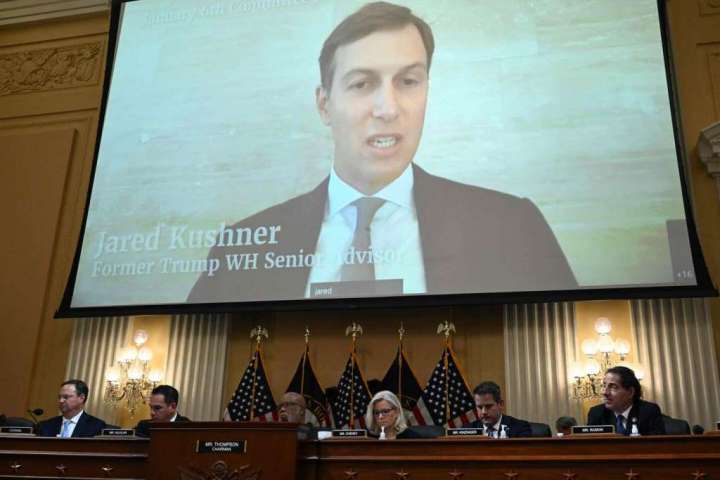Benjamin Dreyer is Random House’s executive managing editor and copy chief and the author of “Dreyer’s English: An Utterly Correct Guide to Clarity and Style.”
The most memorable lines from the Jan. 6 hearings so far

I do not join the chorus asserting that Cheney’s admirably steadfast presence on the committee — and disinclination to join her fellow Republicans, insofar as the attack on the Capitol is concerned, in sticking their fingers in their ears while chanting la-la-la-la-la-la — warrant her immediate ascension to the White House as our next president. But she undeniably has a way with an ultimatum.
Grammar and punctuation aficionados who can recall the difference between a restrictive clause and a nonrestrictive clause will, moreover, take particular note of the absence of a comma in Cheney’s comment as it was presented in the committee’s own transcript: not the blanketly nonrestrictive “my Republican colleagues, who are defending the indefensible,” which would imply that all her fellow party members are pro-insurrection (or at least pro impromptu Capitol visits that include smearing excrement on walls and baying “Hang Mike Pence”), but simply the restrictive “my Republican colleagues who are defending the indefensible.” That points a merciful finger at only a select few. Well, a lot more than a few, but not all.
Political scandals have a way of generating what the “Jeopardy!” people might well dub Potent Quotables. Media coverage last week of the Watergate break-in’s 50th anniversary dusted off President Richard M. Nixon’s notorious “Well, I’m not a crook.” Republicans and Democrats practice bipartisanship when it comes to scandal PQs: It was President Bill Clinton, in the depths of a sex scandal, who contributed the monumentally evasive “It depends upon what the meaning of the word ‘is’ is.”
But enough nostalgia. The Jan. 6 hearings are offering up plenty of lines contending to become permanently evocative of this particular scandal.
There was professional son-in-law Jared Kushner’s comment concerning White House counsel Pat Cipollone’s threat to resign — “I kind of took it up to just be whining, to be honest with you.” And testimony from J. Michael Luttig, an adviser to Vice President Mike Pence and former federal judge, that “Donald Trump and his allies and supporters are a clear and present danger to American democracy.”
Luttig was presumably alluding not to Tom Clancy’s 1989 novel, or the 1994 Harrison Ford film thereof, but to Justice Oliver Wendell Holmes’s 1919 remark in Schenck v. United States concerning Congress’s ability to restrict words “used in such circumstances and … of such a nature as to create a clear and present danger that they will bring about the substantive evils that Congress has a right to prevent.” Well, that was about the 1917 Espionage Act, and this is now.
Or consider Trump adviser/schemer John Eastman’s plaintive email request of presidential whatnot Rudy Giuliani, which seemed ready-made for the umpteenth online adaptation of William Carlos Williams’s poem “This Is Just to Say” (“I have eaten / the plums / that were in / the icebox …”):
I’ve decided / that I should be / on the pardon list / if that is still / in the works.
Then there were Trump’s own immortal words on the evening of Jan. 5, 2021, addressed to his vice president: “I don’t want to be your friend anymore if you don’t do this.” Though I’m reasonably certain I haven’t uttered anything in that vein since I was 12, I’m more than reasonably certain that I didn’t utter it because the thing that one of my friends refused to do was to overturn a national election and instigate a constitutional crisis.
But let’s get back to one key word and the key question that dominates the Jan. 6 hearings: the meaning of “insurrection.” Noted constitutional scholar and lexicographer Tucker Carlson informed us the night after the first committee hearing (not that Fox News aired it) that “an insurrection is when people with guns try to overthrow the government. Not a single person in the crowd on Jan. 6 was found to be carrying a firearm. Not one.”
Working back to front, one might agree that, yes, not a single person in the crowd was packing heat, because, as PolitiFact reports, “Many of those involved in the attack were armed, and several had guns that police later seized.”
And an insurrection, if your dictionary of choice is not whatever Fox News is using but Merriam-Webster, is “an act or instance of revolting against civil authority or an established government.” In the dictionary, unlike on Jan. 6, 2021, not a gun in sight.






